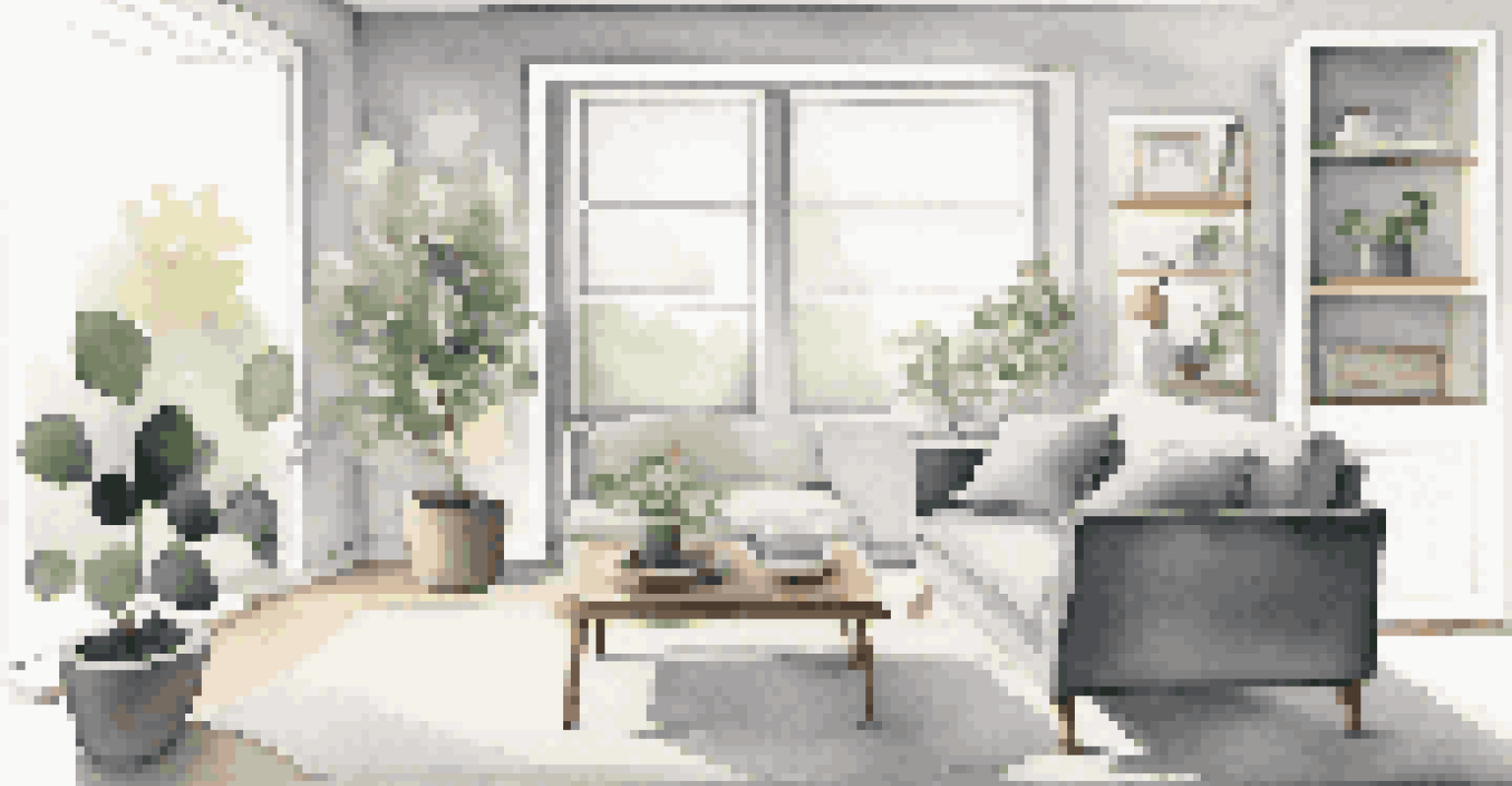Redefining Beauty: Minimalism and Its Aesthetic Philosophy

Understanding Minimalism: More Than Just a Trend
Minimalism is often seen as a lifestyle choice, but its roots run deeper, intertwining with philosophical ideas about beauty and existence. At its core, minimalism advocates for simplicity, encouraging individuals to declutter not only their spaces but also their minds. This approach fosters a deeper appreciation for what truly matters, both materially and spiritually.
Simplicity is the ultimate sophistication.
By stripping away excess, minimalism invites us to focus on quality over quantity. Imagine walking into a room filled with only your favorite items, each one holding a special memory or significance. This selective approach to beauty challenges the conventional notion that more is better, suggesting instead that less can indeed be more.
In this way, minimalism becomes a lens through which we can view the world, offering clarity and peace amidst chaos. It encourages us to reassess our values and redefine beauty on our own terms, paving the way for a more intentional and fulfilling existence.
The Aesthetic Appeal of Simplicity
The aesthetic philosophy of minimalism celebrates clean lines, open spaces, and a curated selection of items that evoke joy. Think of a serene Japanese Zen garden; its beauty lies in its simplicity, where every element serves a purpose. This concept can apply to various art forms, from architecture to graphic design, emphasizing how less can create more impact.

When we embrace minimalism in our surroundings, we often find that our senses are heightened. With fewer distractions, we can truly appreciate the textures, colors, and forms of the objects that remain. This enhanced awareness transforms our perception of beauty, allowing us to find elegance in the ordinary.
Minimalism Fosters Inner Peace
Adopting a minimalist mindset encourages clarity and joy by letting go of excess and focusing on what truly matters.
Moreover, minimalist aesthetics often promote sustainability, encouraging the use of natural materials and eco-friendly practices. This commitment not only elevates the beauty of our spaces but also aligns with a growing awareness of our environmental impact, making minimalism both an aesthetic and ethical choice.
Minimalism in Fashion: The New Chic
In the world of fashion, minimalism has emerged as a powerful statement against the fast-paced, consumer-driven industry. Designers are now favoring timeless pieces over fleeting trends, creating wardrobes that reflect authenticity and individuality. This shift encourages consumers to invest in high-quality garments that last, rather than chasing after every new fad.
The ability to simplify means to eliminate the unnecessary so that the necessary may speak.
Imagine a capsule wardrobe filled with versatile pieces that can be mixed and matched effortlessly. This approach not only simplifies daily choices but also allows for personal expression without the burden of excess. It's about finding your unique style while embracing the beauty of simplicity.
Furthermore, minimalist fashion often emphasizes conscious consumerism, urging individuals to consider the ethical implications of their purchases. By choosing brands that prioritize sustainability and fair practices, we redefine beauty in fashion as not just what we wear, but how it aligns with our values.
The Emotional Impact of Minimalist Spaces
Living in minimalist spaces can have profound emotional benefits, fostering a sense of calm and clarity. When our environments are uncluttered, our minds often feel the same way—free from distractions and chaos. This tranquility can lead to improved focus, creativity, and overall well-being.
Consider the difference between a cluttered desk and a clean one; the latter invites productivity and inspiration. Minimalism encourages us to create environments that reflect our inner selves, promoting peace and mindfulness in our daily lives. It's about crafting spaces that nurture rather than overwhelm.
Simplicity Enhances Aesthetics
The aesthetic appeal of minimalism lies in its ability to highlight beauty through clean lines and intentional choices.
Additionally, minimalist living allows for more intentionality in our surroundings. Each item we choose to keep becomes a source of joy and meaning, reinforcing the idea that beauty is not just in aesthetics, but in the energy and emotions our spaces evoke.
Art and Minimalism: A Dialogue of Form and Space
In the realm of art, minimalism represents a powerful dialogue between form and space. Artists like Donald Judd and Agnes Martin explored how simplicity could evoke profound emotional responses, using basic shapes and colors to communicate complex ideas. Their works challenge viewers to reconsider their relationship with art and beauty.
This artistic movement encourages spectators to engage deeply with a piece, prompting reflection on the space around it. The beauty of minimalist art lies in its ability to evoke thought and emotion through restraint, inviting us to find meaning in what is absent as much as in what is present.
Moreover, minimalism in art aligns with the broader cultural shift toward simplicity and authenticity. As viewers, we are encouraged to seek beauty not just in the artwork itself, but in the experience and emotions it elicits, further enriching our understanding of aesthetic philosophy.
Digital Minimalism: Beauty in the Online World
As our lives become increasingly digital, the concept of minimalism extends into the online realm. Digital minimalism advocates for a more intentional use of technology, promoting a streamlined online presence that prioritizes meaningful connections over superficial interactions. This shift encourages us to curate our digital environments just as we do our physical spaces.
Imagine a social media feed that only features content that inspires and uplifts you, free from the noise of unnecessary distractions. This approach not only enhances our online experience but also fosters a healthier relationship with technology, allowing us to reclaim our time and attention.
Fashion Embraces Timelessness
Minimalist fashion promotes investment in high-quality, versatile pieces that reflect individuality and ethical values.
Furthermore, digital minimalism can lead to greater creativity and productivity. By eliminating digital clutter, we create a space for focused work and self-expression, redefining beauty in the digital age as clarity, connection, and authenticity.
Embracing a Minimalist Mindset: A Journey to Inner Peace
Adopting a minimalist mindset goes beyond aesthetics; it's about cultivating inner peace and clarity in our lives. This philosophy encourages us to let go of what no longer serves us, whether that's physical possessions, toxic relationships, or negative thought patterns. By simplifying our lives, we create space for growth and joy.
Consider the practice of mindfulness, which aligns beautifully with minimalism. Just as we declutter our spaces, we can also declutter our minds, focusing on the present moment and appreciating the beauty in simplicity. This journey fosters a deep sense of gratitude and fulfillment.

Ultimately, embracing minimalism allows us to redefine beauty on our own terms, shifting from societal pressures to a more personal understanding of what brings us joy. It's a continuous journey of self-discovery, where we learn to appreciate the elegance of simplicity and the richness of our experiences.